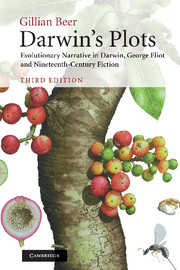Book contents
- Frontmatter
- Contents
- Foreword by George Levine
- Preface to the first edition
- Preface to the second edition
- Preface to the third edition
- Introduction
- Part I Darwin's language
- Part II Darwin's plots
- Part III Responses: George Eliot and Thomas Hardy
- Notes
- Select bibliography of primary works
- Further reading related to Charles Darwin
- Index
Foreword by George Levine
Published online by Cambridge University Press: 04 August 2010
- Frontmatter
- Contents
- Foreword by George Levine
- Preface to the first edition
- Preface to the second edition
- Preface to the third edition
- Introduction
- Part I Darwin's language
- Part II Darwin's plots
- Part III Responses: George Eliot and Thomas Hardy
- Notes
- Select bibliography of primary works
- Further reading related to Charles Darwin
- Index
Summary
Early in Darwin's Plots, Gillian Beer argues that On the Origin of Species is ‘one of the most extraordinary examples of a work which included more than the maker of it at the time knew, despite all that he did know’. With these words Professor Beer initiated an enterprise that itself probably included more than she knew, despite all that she did know – which, to say the least, was a lot. For the book remains as alive and important now as it was when it appeared in 1983, on the first crest of the booming ‘Darwin Industry’, which has in the past fifteen years expanded even beyond the imagination of those who already understood how enormously rich and fertile Darwin's thought remained. Unlike most great scientists of the past, whose work has been absorbed by science (and often by culture) and marked as a brilliant stage toward later developments, Darwin remains strangely and almost charismatically alive – he ‘has grown younger in recent years’, says Professor Beer – and evolutionary biology remains an active force in science and beyond.
Darwin's Plots identifies a ‘remnant of the mythical’ in his arguments, a not quite complete fit ‘between material and theory’, a willingness to fall back on ‘unknown laws’, a passion for multiplicity and for aberrations. In teaching us how Darwin's metaphors and language work, by refusing any simple placement of his thought, either historical or philosophical, Professor Beer in effect predicted his continuing power to fertilise and disturb.
- Type
- Chapter
- Information
- Darwin's PlotsEvolutionary Narrative in Darwin, George Eliot and Nineteenth-Century Fiction, pp. ix - xivPublisher: Cambridge University PressPrint publication year: 2009



